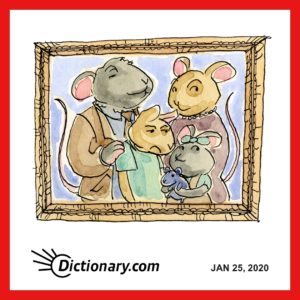Word of the Day
More about fettle
The noun fettle is found most often in the stock phrase in fine fettle “in a good state or condition.” Fettle is originally a British dialect word (Lancashire in northwest England), a verb meaning “to shape, prepare, fix, arrange.” Further origin is obscure: fettle may come from Middle English fetlen (fetelen, fatelen, fitelen) “to shape, fix, put, bestow” and be related to the Old English words fetian “to fetch, bring to, marry,” fæt “cup, vessel, vat,” and feter “fetter.” Or fettle may be related to the Old English noun fetel “belt, girdle.” The sense “to shape, prepare” entered English in the 14th century; the metallurgical and ceramics senses entered English in the second half of the 19th century; the sense “state or condition” in the mid-18th century.
how is fettle used?
Bernie Sanders was, as usual, in fighting fettle.
Mathilde was in fine fettle. The month in Venice had healed all the wounds.
EGOT
noun
the honor of winning at least one Emmy, Grammy, Oscar, and Tony in competitive rather than honorary categories: How many people have won an EGOT?
More about EGOT
The acronym EGOT was coined in 1984 by the American actor Philip Michael Thomas (born 1949) from the initial letters of the Emmy, Grammy, Oscar, and Tony awards. It was later popularized by the TV show 30 Rock. As of 2019, 15 people have accomplished this feat.
how is EGOT used?
Anderson-Lopez’s husband co-created “The Book of Mormon” and “Avenue Q,” and is the youngest person ever to claim the EGOT, or the rare Emmy-Grammy-Oscar-Tony show-biz grand slam.
Porter’s win puts him on the road to EGOT glory.
murine
adjective
belonging or pertaining to the rodent subfamily Murinae, which includes more than 500 species of mice and rats.
More about murine
Murine is an uncommon adjective pretty much restricted in zoology to mice and rats and the diseases they cause or transmit. Murine comes straight from the Latin adjective mūrīnus “of mice, mouse-colored,” a derivative of the noun mūs (inflectional stem mūr-). During the 4th century b.c., original intervocalic s in Latin became r; thus the Roman gens name Papīsius became Papīrius, and mūsīnus (if the word already existed) became mūrīnus. Mūs remains unchanged in the Latin derivative noun mūsculus “muscle.” Mūs is identical with the very common Proto-Indo-European noun mūs, which remains mūs also in Germanic (English mouse); mūs becomes mŷs in Greek, mū́ṣ– in Sanskrit, and mysz in Polish. Murine entered English in the early 17th century.

how is murine used?
His estimate of just over two million rats in the city would have been horrifying but for the long-held belief that New York housed equal numbers of rats and humans, as if a municipal sponsor program had assigned each of the eight million New Yorkers a muck-dwelling murine counterpart.
But in order to study how that activity affects human brains at the cellular level, researchers at the University of Oregon managed to put murine brains into a somewhat equivalent state.